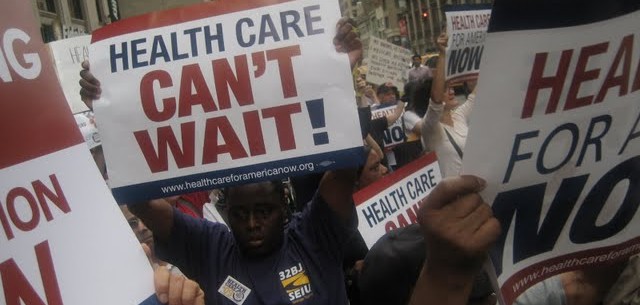Advocates from a variety of consumer health groups and coalitions are kicking into full gear as the all-too-crucial month of March arrives when the state budget will be finalized. They are conducting advocacy days in Albany, placing paid advertising in key media outlets, circulating sign-on letters to legislative leaders, submitting legislative memos on specific budget provisions they support or oppose, dropping off packets of policy materials at legislators’ offices, holding press conferences, organizing “twitter rallies”, posting updates on Facebook, making phone calls, signing-on to email petitions, and convening annual meetings and webinars. Whew!
 One key issue many are promoting is the creation of a new “Basic Health Program” (BHP) to provide very low-cost insurance coverage to lower-income New Yorkers whose incomes are too high for Medicaid and often fluctuate significantly from month-to-month, the “working poor.” While the state’s new health benefits exchange marketplace (“New York State of Health”) has lowered insurance premiums dramatically (more than half compared to 2013) and offers generous financial support to lower-income people to help them purchase a plan, they often still struggle to afford the coverage and/or use it given deductibles and co-pays. In addition, a BHP will bring millions of dollars of new federal funding into New York to help relieve the state of what it spends on its own to provide coverage to lawfully-present immigrants. BHP is an option available to states under the Affordable Care Act starting in 2015. Health Care for All New York is leading this campaign.
One key issue many are promoting is the creation of a new “Basic Health Program” (BHP) to provide very low-cost insurance coverage to lower-income New Yorkers whose incomes are too high for Medicaid and often fluctuate significantly from month-to-month, the “working poor.” While the state’s new health benefits exchange marketplace (“New York State of Health”) has lowered insurance premiums dramatically (more than half compared to 2013) and offers generous financial support to lower-income people to help them purchase a plan, they often still struggle to afford the coverage and/or use it given deductibles and co-pays. In addition, a BHP will bring millions of dollars of new federal funding into New York to help relieve the state of what it spends on its own to provide coverage to lawfully-present immigrants. BHP is an option available to states under the Affordable Care Act starting in 2015. Health Care for All New York is leading this campaign.
A second key issue concerns various measures to improve and expand consumer protections for people who need to go “out-of-network” for care. After a 3-year struggle to forge agreement between insurers, doctors and hospitals, and consumer, Gov. Cuomo’s Dept. of Financial Services has come out with a package of proposals to a) hold consumers harmless when they receive “surprise bills” after hospitalizations, b) establish an independent arbitration to resolve payment disputes between doctors/hospitals and insurers, c) sets standards for the quality of out-of-network coverage (when it is offered by insurers), d) improve disclosure to consumers about provider networks, reimbursement methods and formulas, and provider rates, e) strengthen standards for the adequacy of insurers’ provider networks, including the right to go out of network via an external appeal process, and f) institute a uniform electronic claim form for out-of-network services to be used by insurers and doctors/hospitals. New Yorkers for Accessible Health Coverage is spearheading this campaign.
Another priority is continued funding for community-based consumer assistance programs (CAPs). While a variety of “in-person assisters” (“navigators”, “certified application counselors”, brokers, and agents) are busily signing up individuals, families, and small employers into new health plans available on the New York State of Health marketplace (over 500,000 already!), once people get enrolled in a plan, they often need help figuring out how to use it and trouble-shoot any problems they encounter, particularly if they’ve been uninsured and are not familiar with the very basics of health insurance. Fortunately, the Affordable Care Act provides funding to states to set up CAPs – ours here in New York is known as Community Health Advocates (CHA), a statewide network of many community organizations. Gov. Cuomo has proposed a new appropriation of federal funds for CHA. If you know someone with an insurance problem or with paying a doctor or hospital bill or getting access to a needed medical service, CHA is definitely the place to go!
Finally, advocates for people on Medicaid are promoting the need for important consumer protections as the state continues forward with its “Medicaid Redesign” process to move all Medicaid-covered services into various “care coordination” programs. With the recent approval of the state’s latest “Medicaid Waiver” by the Obama administration, things are now expected to move forward even more expansively. An critical issue related to this new waiver also concerns funding for “vital access” or “safety net” providers that disproportionately serve many people on Medicaid and the uninsured. An important aspect will be funding regional health planning to make sure that all parts of our state and city have services available in their communities. The ongoing hospital crisis in northern and central Brooklyn calls for such a priority. Medicaid Matters New York is leading this effort.
